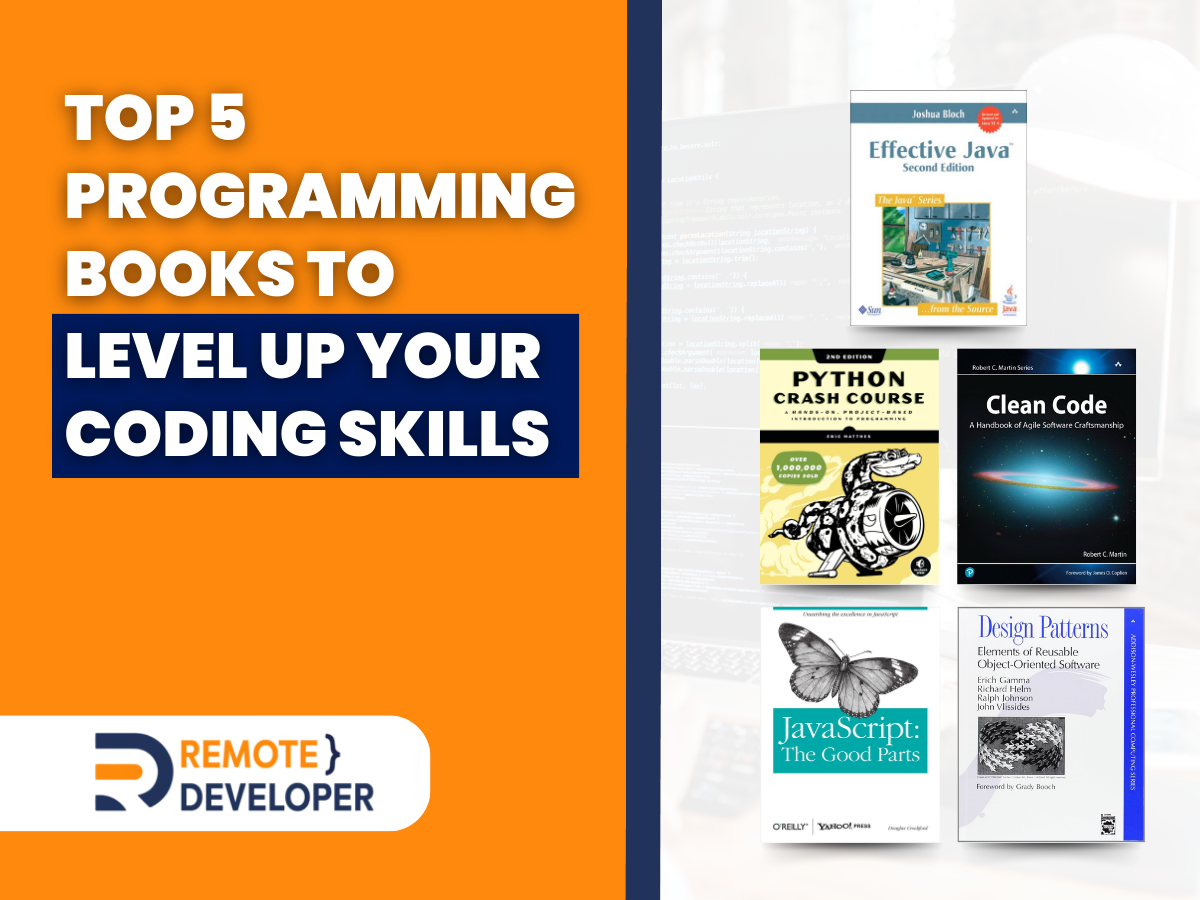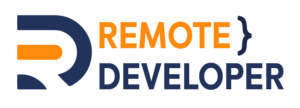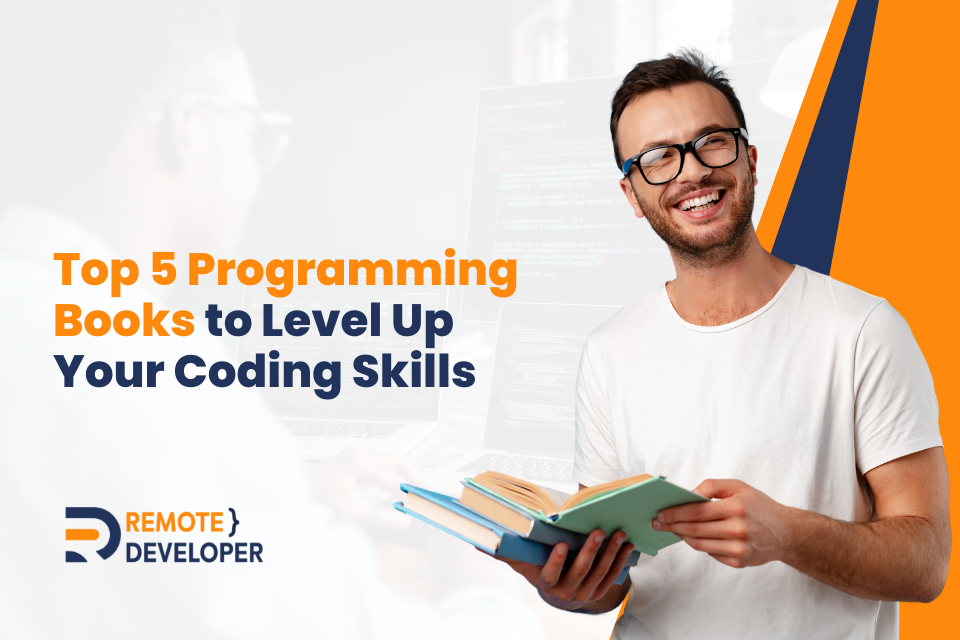In the ever-evolving landscape of technology, staying ahead of the curve is crucial for aspiring programmers and seasoned developers alike. Whether you’re a novice looking to embark on a coding journey or an experienced coder aiming to enhance your skills, the right resources can make all the difference.
One resource that stands out for programmers is books. Books offer a unique perspective, serving as a roadmap to help you navigate the vast and dynamic coding landscape. Thus, in this article, we curated five programming books that can elevate your coding prowess and deepen your understanding of the craft.
From mastering fundamental concepts to exploring advanced techniques, these programming books have been selected based on their ability to provide valuable insights, hands-on exercises, and real-world applications. So, whether you’re interested in web development, algorithms, or mastering a specific programming language, this list has you covered. Join us on a literary journey that transcends the digital realm as we delve into the pages of these programming gems.
What Is The Importance Of Continuous Skill Enhancement In Programming?
Like any other career, continuous skill enhancement is paramount in programming. The demand for skilled programmers continues to grow with the rapidly evolving technological and digital landscape.
With this advancement, however, there is a need for programming professionals to be updated with the latest advancements and trends. Programming languages, frameworks, and tools are evolving. Each day, new ones are being introduced to the market regularly. As professionals, programmers must stay relevant to these technologies and advancements to be competitive.
Moreover, continuous skill enhancement allows programmers to improve their problem-solving abilities. They become more adept at tackling complex coding challenges efficiently as they learn new techniques and approaches. This enhances their productivity and enables them to deliver high-quality code that meets industry standards.
In addition, staying up to date with the latest programming practices helps programmers optimise their code for performance and efficiency. They can leverage new algorithms or design patterns to develop more scalable applications faster.
Furthermore, continuous skill enhancement opens doors to new programming jobs and opportunities. It allows programmers to explore different domains within programming and expand their expertise. By acquiring relevant skills, they can specialise in artificial intelligence, cybersecurity, web development, or mobile app development.
Lastly, continuous skill enhancement fosters professional growth and personal satisfaction. As programmers acquire new knowledge and master new technologies, they gain a sense of accomplishment and fulfilment in their work. It also boosts their confidence when taking on challenging projects or seeking career advancements.
Top 5 Programming Books To Level Up Your Coding Skills

1. Clean Code: A Handbook of Agile Software Craftsmanship by Robert C. Martin
“Clean Code” by Robert C. Martin” is one of the most extraordinary programming books in software development. The book is a comprehensive guide emphasising the importance of writing clean, maintainable, and efficient code. This book draws on his extensive industry experience to provide insights into crafting code that works and is a pleasure to read and modify.
Likewise, it is organised into three parts. The first part of “Clean Code” introduces the principles, patterns, and practices of writing clean code. He discusses code structure, naming conventions, and code organisation fundamentals. The second part delves into case studies of applying these principles to real-world code. Lastly, the third part explores the broader context of clean code within the software development profession.
To further explain its content, here are the skills covered by “Clean Code.”
- Code Readability. The book emphasises the significance of writing code that is easy to read and understand.
- Code Organisation. Techniques for organising code to enhance clarity and maintainability are discussed in detail.
- Naming Conventions. The importance of meaningful and consistent naming conventions is highlighted throughout the book.
- Refactoring. “Clean Code” provides practical advice on refactoring code to improve its structure without altering its behaviour.
- Testing. The book explores the connection between clean code and effective testing practices.
Level of Expertise: This book is perfect for intermediate to advanced programmers. While accessible to beginners, “Clean Code” is particularly valuable for developers with hands-on programming experience. The book assumes a basic understanding of programming concepts and deepens into the nuances of writing high-quality code.
2. Effective Java by Joshua Bloch
“Effective Java” by Joshua Bloch is a comprehensive guide that distils years of programming experience into practical advice for Java developers. The book is structured as a collection of 78 items, each presenting a specific rule or guideline to help Java programmers write more efficient, maintainable, and effective code.
Here are the skills covered by “Effective Java.”
- Java Best Practices. Bloch outlines best practices for using Java features and APIs effectively, promoting code that is not only functional but also idiomatic and elegant.
- Design Patterns. The book explores various design patterns and idioms specific to Java, providing insights into designing robust and flexible software.
- Concurrency. Effective Java addresses the intricacies of concurrent programming in Java, offering guidance on writing thread-safe code and utilising concurrency utilities.
- Error Handling. Bloch delves into effective error-handling techniques, emphasising the importance of proper exception handling and the judicious use of checked and unchecked exceptions.
- Performance Optimisation. The book provides tips on optimising Java code for performance, covering aspects such as object creation, memory management, and efficient use of data structures.
- API Design. Bloch discusses principles for designing clean, intuitive, and well-documented APIs, facilitating better communication between developers.
Level of Expertise: “Effective Java” targets intermediate to advanced Java developers familiar with the language’s fundamentals. The book assumes a certain level of experience and dives into nuanced topics that may be challenging for beginners. Likewise, this book is perfect for seasoned Java developers looking to deepen their understanding, refine their coding practices, and stay abreast of best practices in the evolving Java ecosystem.
3. JavaScript: The Good Parts by Douglas Crockford
“JavaScript: The Good Parts” by Douglas Crockford is one of the best programming books, concisely exploring the best practices and practical techniques in JavaScript. Crockford, a prominent figure in the JavaScript community, distils the language to its most essential and powerful features, helping developers write more efficient and maintainable code.
Skills Covered:
- Essential JavaScript Concepts. This programming book focuses on core JavaScript concepts considered reliable, powerful, and expressive, steering clear of the less desirable parts of the language.
- Object-Oriented Programming in JavaScript. Crockford discusses the best practices for leveraging JavaScript’s unique approach to object-oriented programming, emphasising prototypal inheritance.
- Functions. The book explores the role of processes as first-class objects in JavaScript, emphasising their versatility and power in creating modular and reusable code.
- Scoping and Closures. Crockford delves into the nuances of scoping and closures, helping developers understand and use these features effectively.
- JavaScript Patterns. The author introduces helpful design patterns and coding practices that enhance the readability and maintainability of JavaScript code.
Level of Expertise: While accessible to beginners, “JavaScript: The Good Parts” is particularly beneficial for intermediate-level JavaScript developers who are already familiar with the basics of the language. Likewise, experienced developers looking to deepen their understanding of JavaScript, especially regarding best practices and avoiding common pitfalls, will find value in Crockford’s insights.
4. Python Crash Course by Eric Matthes
“Python Crash Course” by Eric Matthes is a top beginner-friendly programming book designed to provide newcomers with a quick and hands-on introduction to Python. Through a pragmatic approach and a series of projects, the book aims to help readers build a solid foundation in Python programming.
Skills Covered:
- Python Basics. Matthes covers fundamental Python concepts, including variables, data types, control structures (if statements, loops), and functions, ensuring readers grasp Python’s programming essentials.
- Data Structures. The book introduces critical data structures such as lists, dictionaries, and tuples, exploring how to manipulate and organise data effectively.
- Object-Oriented Programming (OOP). Matthes guides readers through the basics of object-oriented programming in Python, helping them understand how to create and use classes and objects.
- File Handling. The programming book covers reading from and writing to files, an essential skill for working with data persistence and external resources.
- Web Development Basics. Matthes introduces web development with Python, including building a simple web application using Django, a popular Python web framework.
- Testing and debugging. The book introduces the importance of testing and debugging, emphasising best practices for ensuring code reliability.
Level of Expertise: “Python Crash Course” is explicitly designed for beginners with little to no programming experience. It is an excellent starting point for individuals looking to learn Python as their first programming language. While beginner-friendly, the book is also suitable for individuals who are self-taught and want a structured resource to enhance their Python skills.
5. Design Patterns: Elements of Reusable Object-Oriented Software by Erich Gamma, Richard Helm, Ralph Johnson, and John Vlissides
“Design Patterns” is one of the most formative programming books introducing and cataloguing essential design patterns—proven solutions to recurring problems in object-oriented design. Authored by the “Gang of Four” (Erich Gamma, Richard Helm, Ralph Johnson, and John Vlissides), the book is a comprehensive guide for developers seeking to create flexible, maintainable, and scalable software systems.
Here are the skills covered in this programming book.
- Design Pattern Recognition. This programming book introduces readers to common design problems and provides solutions in the form of design patterns. It enhances the ability to recognise recurring challenges in software design and apply proven solutions.
- Object-Oriented Design Principles. “Design Patterns” emphasises applying fundamental object-oriented design principles, such as encapsulation, inheritance, and polymorphism, in building robust and adaptable software systems.
- Architectural Pattern. The authors delve into architectural patterns that address high-level design concerns, including the organisation of subsystems and their interactions.
- Code Reusability. Design patterns promote code reusability by providing standardised solutions to common design challenges. Developers learn to leverage existing patterns to enhance the efficiency and maintainability of their code.
Level of Expertise: “Design Patterns: Elements of Reusable Object-Oriented Software” is perfect for intermediate to advanced programmers. Likewise, this book is also valuable for software architects and designers looking to enhance their skills in creating scalable, maintainable, and extensible software architectures.
Conclusion
Embarking on a journey to elevate your coding skills is a commendable pursuit. We hope the programming mentioned above programming books will serve as an invaluable companion on your growth path.
Remote Developer waits for you if you’re ready to embark on real-world projects, network with experienced developers, or seek mentorship to refine your skills. Contact us today, and let us help you with your coding career!

